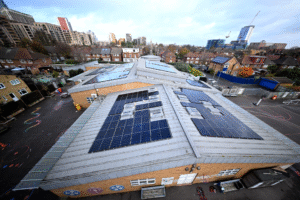A new report by the World Economic Forum presents 11 strategies for unlocking growth while reducing CO2 output from the built environment.
The research suggests that if all recommendations are implemented, it should be possible to cut greenhouse gas output from buildings by 80% overall. This market could be worth $1.8trillion.
Largely driven by effective energy efficiency and management, for the first time ever artificial intelligence [AI] systems were seen as more important than insulation and traditional renovations.
Produced by the World Economic Forum [WEF], the report encourages investors to look at digitisation of buildings operations as strong portfolio additions. Meanwhile, architects and engineers are urged to deploy energy management technologies.
‘It was only a matter of time until we see AI-driven platforms highlighted in the most influential reports. They enable real-time optimization of building energy systems, managing data from thousands of sensors to ensure peak efficiency,’ said Donatas Karčiauskas, CEO of Exergio, a leading company in the Baltics that focuses on AI-based building energy performance solutions.
‘This approach aligns perfectly with the WEF’s strategies, facilitating significant emission reductions and operational improvements,’ he continued. ‘As energy performance platform providers, we know that investing in digitalization and AI-based solutions is not just about cutting costs anymore; it’s about unlocking new revenue streams and creating long-term value. Achieving up to 20% in energy savings is a common practice for us, however, we also see increased user satisfaction in the buildings whose energy performance is controlled using AI solutions.’
You can read the full report here.
More on energy:
WATCH: Only thermal spring in Wales becomes renewable energy source
North Sea Transition Authority begins investigations into oil well decommissioning delays
















